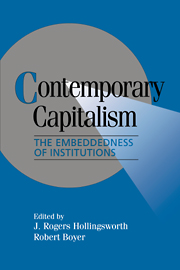Book contents
- Frontmatter
- Contents
- Acknowledgments
- List of Contributors
- Chapter 1 Coordination of Economic Actors and Social Systems of Production
- PART I THE VARIETY OF INSTITUTIONAL ARRANGEMENTS AND THEIR COMPLEMENTARITY IN MODERN ECONOMIES
- PART II HOW AND WHY DO SOCIAL SYSTEMS OF PRODUCTION CHANGE?
- PART III LEVELS OF SPATIAL COORDINATION AND THE EMBEDDEDNESS OF INSTITUTIONS
- PART IV CONCLUSION
- Index
PART I - THE VARIETY OF INSTITUTIONAL ARRANGEMENTS AND THEIR COMPLEMENTARITY IN MODERN ECONOMIES
Published online by Cambridge University Press: 05 June 2012
- Frontmatter
- Contents
- Acknowledgments
- List of Contributors
- Chapter 1 Coordination of Economic Actors and Social Systems of Production
- PART I THE VARIETY OF INSTITUTIONAL ARRANGEMENTS AND THEIR COMPLEMENTARITY IN MODERN ECONOMIES
- PART II HOW AND WHY DO SOCIAL SYSTEMS OF PRODUCTION CHANGE?
- PART III LEVELS OF SPATIAL COORDINATION AND THE EMBEDDEDNESS OF INSTITUTIONS
- PART IV CONCLUSION
- Index
Summary
For many years, social scientists have had a division of labor in studying the key institutions constituting a modern economy. Political scientists have given privileged attention to power and have focused major attention on the state as the key institution for coordinating or coercing individual behavior. For them and for many other social scientists, the market was the basic coordinating mechanism of an economy and should be investigated by an economist. In the case of market failure, some public intervention was supposed to occur in order to restore the optimality of an equilibrium, and ideally this should be one of the functions of the state, along with the enforcement of property rights. This issue too drew the attention of political scientists. However, the concerns of political scientists and the economists were generally quite different. In contrast with both, many sociologists argued that the nature, role, and emergence of social norms was the starting point of any investigation about the viability of any political and/or economic system.
In recent years, however, social scientists have begun to challenge this division of labor (Coleman, 1991). First, a few theoreticians have applied rational choice axioms to some basic issues in political science, thus developing some of the same methods as have many economists. Other political scientists, using different theoretical tools and methods, have argued that variation in the mobilization of interest groups explains divergences in macroeconomic performances among industrialized countries (Hollingsworth and Hanneman, 1982).
- Type
- Chapter
- Information
- Contemporary CapitalismThe Embeddedness of Institutions, pp. 49 - 54Publisher: Cambridge University PressPrint publication year: 1997
- 16
- Cited by



